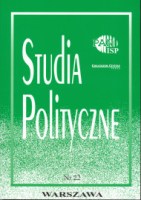Sfera pomocy społecznej a obywatelskie społeczeństwo informacyjne w Polsce. Przykład Programu Rodzina Rodzinie
The welfare sphere and the civic information society in Poland. The example of the Family-to-Family Programme
Author(s): Rafał WojciechowskiSubject(s): Social Sciences
Published by: Instytut Studiów Politycznych PAN
Summary/Abstract: The author asks a question of substantial theoretical and practical significance; what should welfare look like to in an information- and network-based civic society? In Part I, he concisely appraises the condition of the civic society in Poland in the light of sociological and statistical research, as well as the forms of its activity, with particular emphasis on welfare activities. He points to a series of challenges faced by the civic society in the welfare sphere. He then considers whether these challenges may be met using the new information and communication technologies (ICT). In order to emphasise the force the impact of the progress in communication, driven by the development of the mass media, exerts on the civic society, he introduces the term "civic information society" (Part II). Analysis of the interdependencies between the welfare state, the market and the civic society points to the fact that the welfare system has already changed, creating a space for new forms of welfare provision suited to the emerging information society. The examples of social initiatives based on ICT which are quoted in the article demonstrate that, in practical terms, a substantial part of this space may be developed rationally. Part III presents the "Family-to-family" programme, developed and implemented by the author. This programme, notwithstanding the need to fine-tune its details, proves that the operating mechanism of the civic support system, based on the direct actions of common people, with simultaneous restriction on the intermediating role in the transfer of assistance by the NGOs, ensures high efficiency in attaining the assumed objectives and generates social capital. The accomplishment method, based on the ICT applications, ensures high operational efficiency, while also eliciting high interest and involvement on the part of the Internauts in providing direct assistance to the needy.
Journal: Studia Polityczne
- Issue Year: 2008
- Issue No: 22
- Page Range: 147-188
- Page Count: 42
- Language: Polish

